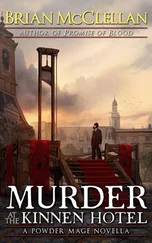“Okay, I’ve got an idea for a ghost story,” Renata said. This was a game they played sometimes, when Renata was posing and starting to get bored, because they’d both loved ghost stories since childhood. “A guy gets hit by a car and dies, and then after that the intersection’s haunted, but the ghost isn’t the guy who gets hit by the car, the ghost is the car.”
Olivia stepped back for a moment, considering the eye problem. “So it’s a story about a ghost car?”
“The driver feels so guilty about the accident that his guilt manifests as a ghostly car.”
“I like it.”
It was cold in the studio that day and Olivia was mostly working on Renata’s face and shoulders, so Renata was wearing a bathrobe that she hadn’t bothered to close. Olivia heard her friend and neighbor Diego’s voice in the hall, his quick knock and entry, and turned in time to see Lucas catch sight of Renata’s breasts and do a double take that he tried to cover with a coughing fit.
“Fumes getting to you?”
“Those’ll go straight to your head,” Renata said, in that languid voice that always made her sound stoned, which often she was, but on this particular occasion she wasn’t.
“I’m glad you’re here,” Olivia said to Lucas, which in those days was one of her signature lines. (A revelation earned only in hindsight: beauty can have a corrosive effect on character. It is possible to coast for some years on no more than a few polished lines and a dazzling smile, and those years are formative.) “We’ll be done in a few minutes.”
Lucas stood by the door, awkward. She sensed his taking in the work. In anticipation of his arrival, Olivia had propped seven of her best recent portraits around the room. She’d been experimenting with surrealist backgrounds: the subject painted with eighteenth-century fealty to realism—or as close as she could get to eighteenth-century fealty to realism; she was aware at all times of the limits of her technical skills—but backgrounds dissolving into a fever dream of red, of purple, of blue, interiors breaking apart into formlessness, landscapes where the light was all wrong. In her most recent completed painting, Diego was sitting on a red chair, relaxed, his arm draped over the back, but the chair lost form at its extremities and dissolved into the wall, and a red pool had formed under one of the chair’s feet, as if the paint were running off.
“That chair bleeding?” Lucas asked, indicating the Diego painting with his chin.
“Take off your robe?” Olivia said to Renata, who rolled her eyes but didn’t object. Her naked flesh had the desired effect of shutting up Lucas. He forgot about the bleeding chair. (Something that troubled her even years later, decades later, all the way to 2008: Was the bleeding chair even a good idea? Were any of her artistic ideas ever actually any good? Her self-doubt had been one of the few constants in her life over the past half century.) “If you want to hang out,” Olivia said to Lucas, “we’ll be done in a half hour.”
“Twenty minutes,” Renata said. “I have to pick up my kid.” When she left, Lucas took her place on the chair. He hadn’t spoken since the bleeding-chair comment.
“You’re overdressed for the occasion,” Olivia said, but it came out softer than she intended, not at all sharp. Perhaps she could be a gentler person, she thought. Her shell was so hard in those days. “Can you take off your shirt?”
Lucas shrugged and took off his denim jacket and undershirt. He was skinny and unpleasantly pale, a strictly indoor creature. He watched her as she began. She was thinking about his work, the clean lines and restraint in his portraiture. He was ridiculous in some ways, but beneath all that he was a serious person, she understood that, he was a serious person who worked very hard. She painted rapidly, not at all in her usual style, swift short strokes. She’d hoped that if she skimmed the surface of the portrait she might be able to see him better, that something might become apparent that she could use as a starting point for a deeper, more serious work, and something did: when she stepped back to look at the canvas she saw the shadows on his face, the look she’d seen before on others, the awkward way he held his arms.
“Turn your left arm toward me,” she said, demonstrating.
He smiled and didn’t move. But she caught a glimpse as he reached for his shirt, and added it later: she painted over his left arm so that in the final version his palm was open, shadows streaked on his inner elbow, bruised veins.
—
At the opening five months later, he cornered her by the door. “I could kill you,” he said pleasantly, smiling so that anyone looking would think he was complimenting her work. Two or three people who weren’t out of earshot moved closer, curious. “I don’t mean this in the screwball-comedy sense, by the way, as in ‘They just got off on the wrong foot and now they’re going to fall in love.’ I mean that given the chance I could actually literally kill you.”
“Live by the sword, die by the sword.” Olivia raised her drink.
“You think you’re so cute. All those canned fucking lines. It’s not even accurate, ” he said, a whine entering his voice, “you’re a fucking liar, ” but in ten months he would OD behind a restaurant on Delancey Street. She went to a show of his just before the end, a group exhibition in a warehouse in Chelsea. It was an underwhelming evening. The night was freezing and the room was too cold, everyone shivering with their cups of cheap wine. A few people recognized Olivia and she saw their jealousy under their smiles, which made her feel small and hollow and like she just wanted to go home. This was the thing about her life in those years: some nights it was beautiful but some nights there was such pain, throbbing just under the surface of the evening for no discernible reason, and on nights like that she understood why Lucas and Renata did what they did, the dulling trick with the needle. She found Lucas in a far corner with three of his paintings. He’d been working on a new series without people in it, just empty streets. General streets, not specific streets. She suspected they belonged to no particular city.
“I like these,” Olivia said, as a peace offering. Lucas was with a kid, a boy wearing sneakers and jeans with an untucked shirt. This was what she remembered of her first sight of Jonathan Alkaitis, years later: that his untucked shirt was somehow poignant. The kid had suburbia written all over him but had untucked the shirt in order to look looser, more downtown, because he wasn’t quite fourteen years old and was desperate to fit in, but the shirt was deeply creased around the waist where it had been tucked into his pants before he left the house.
“Thanks so much,” Lucas said flatly.
“Who’s your little friend?”
“My brother. Jonathan, meet Olivia. Olivia, Jonathan.”
“Pleased to meet you,” Jonathan Alkaitis said. He was wide-eyed, out of his element. “Do you not like my brother’s paintings?”
“I just said I liked them.”
“You’re a terrible actor, though,” Lucas said. “Even the kid can tell you don’t like them.”
Olivia did not, in fact, particularly like Lucas’s new paintings. They were derivative of Edward Hopper and could only have been more obvious in theme if he’d maybe painted the word LONELINESS across them in red.
“You’re right,” Olivia said to Jonathan. “I don’t particularly like your brother’s paintings.”
Jonathan frowned. “Then why did you say you liked them?”
“Just trying to be polite,” she said. “If you’ll excuse me.” She didn’t understand what Lucas was striving for but she could see where he was going, his face more shadowed than it had been, that awful pallor, and she didn’t see the profit in engaging with him seriously. (This was how she thought in her twenties: I didn’t see the profit. She was ashamed of this later.) Death was already in him. Anyone could see that he was halfway out the door. She remembered later that she’d felt sorry for his brother, who was going to be an only child soon.
Читать дальше












